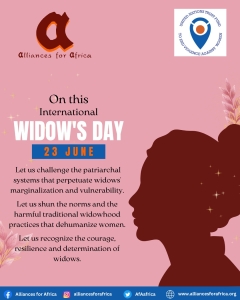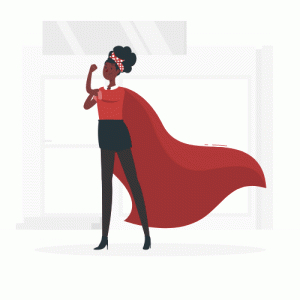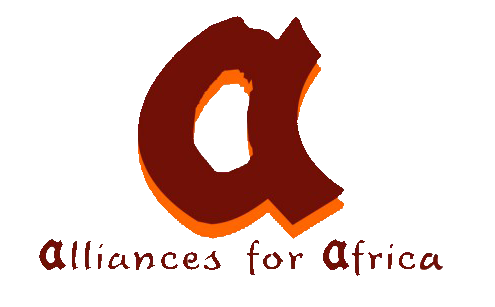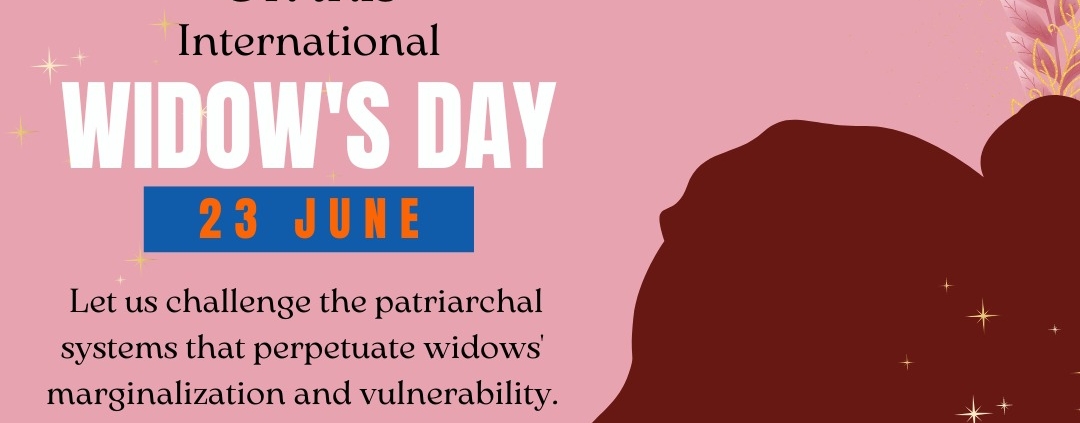Alliances for Africa observe International Widows Day in solidarity with the Rights and Protection of Widows globally.
/0 Comments/in News and Events/by Rejoice
PRESS STATEMENT
FOR IMMEDIATE RELEASE
23/6/2023
Alliances for Africa observe 2023 International Widows Day in solidarity with the Rights and Protection of Widows globally.
Today, as the world observes International Widows Day, Alliances for Africa joins hands with individuals, organizations, and communities globally to raise awareness about the challenges faced by widows and advocate for their rights and empowerment. This annual day, celebrated on June 23rd, presents an opportunity to shed light on the plight of widows and work towards creating a more inclusive and supportive society for them.
According to the United Nations Trust Fund on Ending Violence Against Women, widows, who number over 258 million worldwide, have historically been overlooked, unsupported, and marginalized in our societies. Nigeria alone is estimated to have approximately 15 million widows, with factors such as the rise of Covid-19, ethnic conflicts, terrorism, violence, and health issues exacerbating the prevalence of widowhood and leaving more than 80% of these women in vulnerable circumstances due to the loss of their partners.
International Widows Day serves as a platform to spotlight the daily challenges, struggles, and discrimination faced by widows. For instance, consider the story of Hanna, a young widow in her early forties, who faced unimaginable challenges following the death of her husband. Her husband was tragically murdered by a relative, and without her consent, the perpetrators hastily carried away his body for burial on the same day. As if that weren’t enough, she and her children were immediately driven out of the family house, disregarding their physical, emotional, and psychological well-being. Shockingly, this incident took place in 2021, highlighting the continued victimization of widows.
The harmful cultural practice of “Nkuchi Nwanyi,” which involves the forceful inheritance of a widow by her deceased husband’s brother, is another issue of concern. In the Akabor community of Oguta, Imo State, the vulnerable women who resist or refuse this unjust tradition not only face the hardships of being stripped of their role as farmers on communal land but also endure the absence of support and protection they desperately need at this stage in their lives. This form of disinheritance is compounded by the denial of their rightful position if their deceased husband was the first son in the family, further subjecting them to economic, emotional, and psychological violence.
Additionally, the harmful practice of stigmatization and isolation of widows persists in the Amaigbo community, Imo State. This age-old culture, for which the community cannot provide justification, isolates widows from the palace regardless of weather conditions. This appalling practice perpetuates stigmatization, denies the freedom of association, and represents a complete contradiction to the domesticated Violence Against Persons Prohibition (VAPP) law in the state, which aims to protect the rights of women.
We cannot ignore the various other forms of economic insecurity, stereotypes, and barbaric traditional practices widows face on a daily basis, including the dehumanizing rituals of hair shaving, ritual cleansing, and the drinking or bathing with corpse water. These practices have severe consequences on widows and perpetuate discrimination, reinforce gender inequalities, and hinder the overall development of our communities. They are acts of violence against women.
As a feminist organization dedicated to protecting and promoting gender justice, equality, and human rights, Alliances for Africa acknowledges the urgent need to address the vulnerabilities faced by widows in our communities. We strive to safeguard and advance the rights of widows in Nigeria and beyond, working towards a world where they can live with dignity and autonomy.
Widowhood is an inherently challenging period for any woman, marked by the loss of a loved one and the subsequent adjustments to a new life. The additional burden imposed by society and harmful widowhood practices further intensifies their suffering and violates their fundamental human rights. With the support of the United Nations Trust Fund on Ending Violence Against Women, we firmly reject harmful widowhood practices in all regions.
We say NO to patriarchy, which perpetuates gender inequalities and restricts the rights and opportunities of women. We vehemently oppose harmful widowhood practices in Imo State, Nigeria, and worldwide, and call upon women to support one another and refuse to participate in or allow the dehumanization of widows. Today’s challenges may become our own tomorrow if we fail to challenge the status quo.
OUR DEMANDS:
On this 2023 International Women’s Day, we base our demands on the provisions of the Violence Against Persons Prohibition (VAPP) Law. According to Section 2, Subsection 17 (i) of the VAPP Law, every woman is entitled to the fundamental human rights guaranteed under Chapter IV of the 1999 Constitution of the Federal Republic of Nigeria (as amended). Thus, no harmful widowhood practices should be imposed on any woman.
Enforcement of the VAPP Law:
We call for the establishment of the Imo Agency for the Prohibition of Violence Against Persons, a regulatory body that will ensure the implementation of the VAPP Law. This agency will serve as a legal framework to promote and protect the rights of widows, ensuring that perpetrators of harmful practices against widows face the full consequences of the law.
Economic Empowerment:
We advocate for the creation of economic empowerment initiatives to provide widows with vocational training, skill development programs, and access to financial resources. By encouraging entrepreneurship and inclusive employment opportunities, we enable widows to support themselves and their families.
Social Support System:
We urge the promotion of a social support system that fosters inclusive communities, providing emotional support and social networks for widows. This includes raising awareness about widowhood-related issues, combating stigma, and promoting empathy and understanding within society. Furthermore, we emphasize the importance of prioritizing the physical and mental health needs of widows by ensuring access to healthcare services, counseling, and support groups. Gender-sensitive healthcare policies should be promoted to address the unique challenges faced by widows.
Alliances for Africa remains resolute and committed to raising awareness through educational campaigns and engaging in dialogues that challenge societal norms and stereotypes associated with widowhood. We stand in solidarity with women everywhere.
Alliances for Africa is an African-led international non-governmental organization dedicated to human rights, peace, and sustainable development. Working with partners across Africa and beyond, we advocate for the protection of human rights, promote women’s participation in leadership and governance, build institutional capacity, advocate for gender justice, equality, and non-discrimination, and promote peace, security, and conflict resolution interventions.
Ms. Iheoma Obibi
Executive Director
Alliances for Africa
World Bank, Owerri, Imo State
Website: www.alliancesforafrica.org




Leave a Reply
Want to join the discussion?Feel free to contribute!